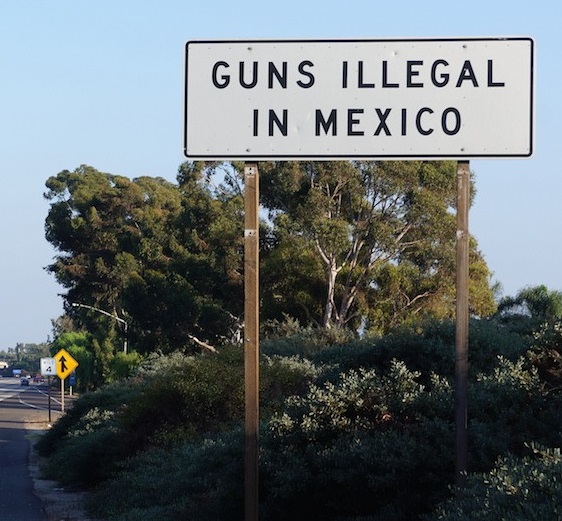Similar to the 2nd Amendment of the US Constitution, Mexico's constitution also guarantees the right to bear arms, but it stipulates federal law, "will determine the cases, conditions, requirements and places" of gun ownership.
Current Mexican law allows citizens one handgun and up to nine rifles if they can prove they are members of a shooting or hunting club. A separate permit is required to carry the guns in public.
Each day the Mexican gun store sells, on average, just 38 firearms a day to civilians.
In contrast, an estimated 580 weapons per day are smuggled into Mexico from the US.
According to the Bureau of Alcohol, Tobacco, Firearms and Explosives, roughly 70% of guns recovered by Mexican law enforcement officials from 2011 to 2016 were originally purchased from legal gun dealers in the United States.
That paradox is increasingly relevant given Mexico's unprecedented levels of gun violence, which have claimed more than 100,000 lives over the last decade. By contrast, the US lost approximately 58,000 troops during the entire Vietnam Conflict which history records American involvement from 1961-1975.
Last year was Mexico's deadliest year for killings since the government began releasing homicide statistics in 1997. In 2021 Mexico is on track to surpass that record.
Fueling the violence is the American drug users appetite for illegal substances. In turn, corrupt Mexican officials routinely look the other way as tons of narcotics travel north to the US border.
Despite the internal issues, elected Mexican leaders have been vocal about the issue.
In 2012, President Felipe Calderon erected a giant billboard in Juarez that spelled out "No more weapons." The letters, formed using crushed firearms seized by authorities, were visible from Texas.
Inside the Directorate of Arms and Munitions Sales the atmosphere is far more sterile and subdued than the typical US gun store or pawnshop. There are no posters on the wall or promotional specials. All the guns are stamped with the Mexican Army's logo and are kept in locked cases. Potential customers aren't given the chance to heft a rifle to their shoulder to see how it feels. Potential buyers can often spend hours shuffling between different counters to get paperwork processed. As customers linger for long stretches under fluorescent lights in DMV style hard plastic chairs, Eduardo Tellez, a hardened Army colonel, manages the store and heavily armed soldiers patrol the aisles.
Tellez is not shy in telling reporters he personally believes gun ownership is a privilege. He sees his job as making sure firearms end up in the hands of "moral and responsible" people only.
Gun enthusiast Fausto Gerard works for Grand Power, a Slovakian gun manufacturer that supplies weapons to the Mexican military. Gerard is also the silent partner in a gun store in the United States. He is passionate about bringing the sport of target shooting to Mexico. Still, he thinks limits are OK. “It's good to have liberties, but there has to be a mechanism for control," he said. He said he would support even more restrictions, including screening for mental illness among gun buyers.
But he thinks Mexico could do more to encourage people to buy guns legally. Having just one gun store in the entire country is impractical, he said. It might even encourage people to buy firearms coming in from the United States. "In Tijuana or Juarez," he said, "it's much easier buying a gun on the black market."



We have all heard it: “Guns are illegal in Mexico.”
In reality, that simple statement isn’t exactly accurate.
Like the United States, private citizens can own guns in Mexico. Like their American counterparts, Mexican citizens can legally purchase firearms at a gun store. But that’s about where similarities end between the two countries that share a common, 1900 mile border.
Unlike the United States, Mexico has only one gun store in the entire country.
Housed in a nondescript concrete building, the store resides behind a Fort Knox style layer of security on a heavily guarded military base in the suburbs of its capital, Mexico City.
To even enter the Directorate of Arms and Munitions Sales, potential customers undergo months of multi layered background checks. Prospective gun owners must also offer a birth certificate and proof that they are employed and have no criminal record. Upon entering the store, each prospective customer is frisked by uniformed soldiers.


